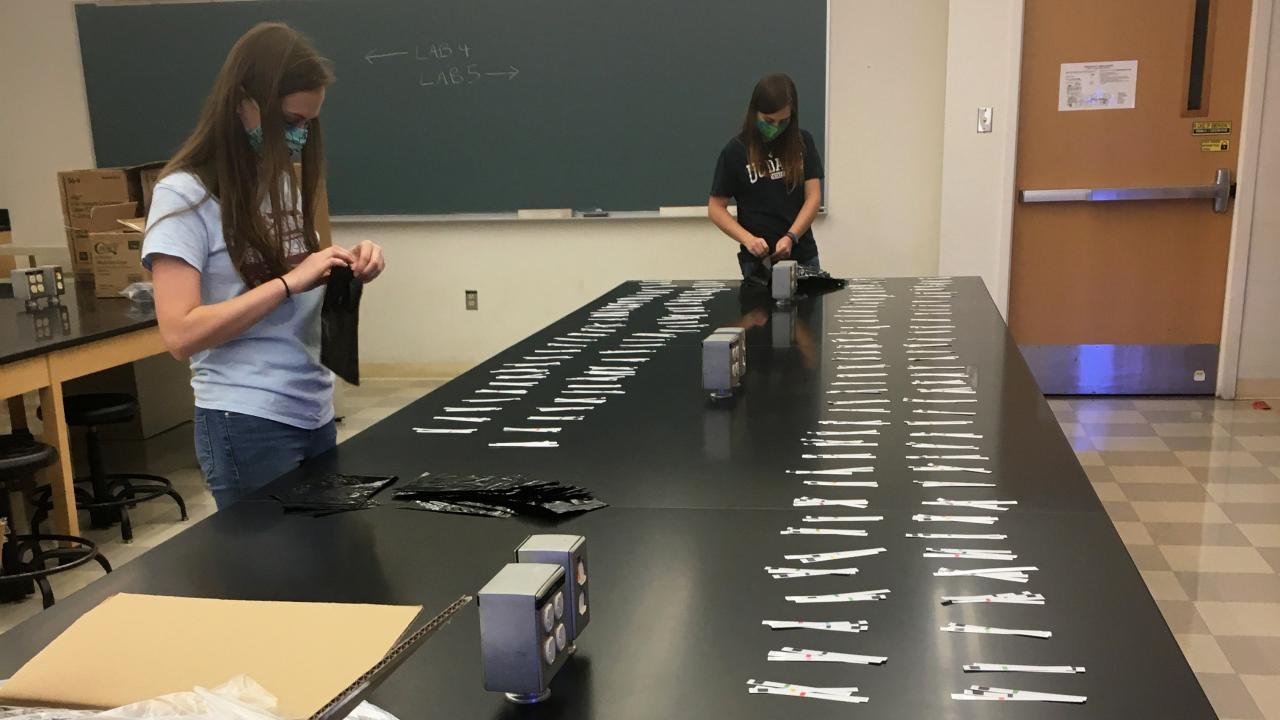
Biology Students Appreciate Hands-On Labs Delivered to Their Doors
Faculty, staff aim to ‘recreate some of the excitement inherent in lab classes’
How do you give students a chance to have some hands-on lab experience during a pandemic? That was the question that motivated the team from the introductory biology series courses to figure out a way.
"Remote instruction due to COVID has been challenging for faculty and students alike,” said Susan Keen, vice-chair of the Department of Evolution and Ecology, “but the biggest regret for faculty and staff in introductory biology has been that the students will not have a chance to do hands-on experiments or work with live organisms.”
That’s why more than 2,000 packets — including seeds, soils of varying nutrient levels, instructions for growing fungi and even a tiny microscope that can be attached to a smartphone to take pictures — were mailed to introductory biology students in the fall quarter.

This has helped “recreate some of the excitement inherent in lab classes,” Keen added.
Pat Randolph, academic coordinator for BIS 2B elaborated.
“Our goal was to try to recreate an active learning experience at home even though the course is online. … So we thought about which labs we could modify and mail to them.” Randolph noted that this wasn’t possible for all lab experiences, “but for some labs, we got them away from a computer.”
The kits mailed to students, said academic coordinator for BIS 2C Geoff Benn, replicated projects they would do if attending labs in person.
For one project, Benn said, “The students received tomato seeds and two rock wool cubes — one had complete fertilizer and the other was deficient in either nitrogen or phosphorus.” Throughout this quarter, “The students grew the tomatoes and then had to look at the symptoms to try to figure out which mineral their plant was deficient in.”
Like so much during the COVID-19 pandemic, many details had to be considered and reconsidered as teaching methods were completely upended.
“We had to think about where (students) might be,” Randolph said. ”Are they in lock-down and can’t go outside? Are they in a very urban environment and don’t have a yard or a park close by? Would it be safe to go outside?”
While the academic coordinators imagined that students in Davis would be able to visit the Arboretum to observe plants throughout the course, they knew this wasn’t possible for all those enrolled in the introductory courses.
Additionally, there were concerns about physical distancing, Randolph said. “We strongly encouraged them to not work together, which goes against our normal philosophy.”
Students appreciate 'sense of normalcy'
Comments from BIS 2C students who received the packets were growing, er, glowing.
The introductory biology students praised the contents of their packets, noting that it was educational as well as fun to have the microscopes, and that they felt like “normal” students again.

“I think this was a really fun activity, being able to grow plants and see their development,” said Brian Hoang. “I am really bummed that I could not do more BIS labs in person, because I loved BIS 2B labs, so it's nice to be able to get some hands-on experience in this class.”
Added Hoang, “It's also kinda fun to play ‘detective’ and figure out what's happening to these plants and what type of deficiency they are experiencing.”
Johnny Nguyen was thankful for the hands-on experience, as well.
“It helps students feel some sense of normalcy,” he said, “and I had a great time showing my experiments’ progress to my family.”
Explained Michael Talty, “The microscopes are probably the best thing to happen this quarter. So much fun and use. It extremely useful for the class, and a great tool to just have.”
And Octavio Zarate Rocha summed it up this way: "Thanks to this microscope, my roommates and I have had a blast identifying different organisms. My roommates already took BIS 2C and were just as excited as I was when we would use the pocket microscope.
"My most memorable organism that we identified using the microscope were the sporangia of a fern," he continued. "We traveled all the way to San Francisco a random Tuesday and ended up bringing back home a leaf of a fern and examining it. Thank you so much for gifting us such an amazing tool and making learning fun. "
All in all, the team has been happy with the student response.
Said Keen of this unusual quarter, “We need to celebrate the bright spots, and it is clear that this program is a bright spot!”

